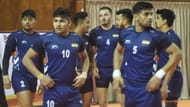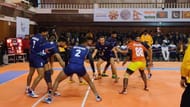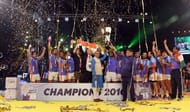The Indian men's Kabaddi team continued their traditional stronghold in the sport of Kabaddi in the 13th South Asian Games, convincingly winning their 10th gold medal in the competition's history. The domination seemed unchallenging with no prior competitiveness among other teams in comparison to India. However, one of the major takeaways from the event was a new-look Indian Kabaddi team that underwent a complete revamp after a series of losses in recent times.
The team with a new panel of coaches opted to select a perfectly balanced squad with the right mix of youth and experience based upon their performances in the 66th Senior National Kabaddi Championship. With a highly experienced skipper in Deepak Niwas Hooda, the team made sure it didn't have the problem of plenty yet again in the raiding department, which the side had suffered in the 2018 Asian Games.
India's notable achievement was versatility in its offense, with the likes of Pawan Sehrawat, Naveen Kumar, Darshan Kadian, and Vikas Khandola rising in the rankings as emerging talents of the Pro Kabaddi League. The raiders showed their adaptability whether to lead the attack up front or to take risks in do or die situations. Every player could fit in the mold as per the requirement of the game.
However, in the past, India was known to have a prestigious raiding line-up with only big names making into the squad, based on their long-term experience. During that phase, the team was vague regarding who would be their lead and support raiders, and who would take risks in the critical situations of the matches.

A new corner combination of Nitesh Kumar and Vishal Bhardwaj took the defensive charge for the team which was long overdue. Having persisted with the cover duo of Manjeet-Surjeet for a long time, the mix of Sunil Kumar and Parvesh Bhainswal in the Indian team left a statement in the event regarding how they could carry the legacy and make a name for themselves in the process.
Not to be forgotten, the experienced raiders in Deepak Niwas Hooda and Pardeep Narwal led from the front when the team needed them the most. Deepak, having represented India since the 2016 South Asian Games, was an ideal fit as the captain of the Indian Kabaddi team. He replaced Ajay Thakur as the next possible long-term captaincy option for the side in the days to come.
While it was a maiden stint for Haryana's Amit Hooda in Indian colors, Surender Nada returned to playing Kabaddi since January earlier this year. They had limited roles to play, but the team remained ensured of having able replacements to the frontline defense.

India proved their 'pre-favorites' tag in the gold-medal clash by overcoming Sri Lanka with a 51-18 margin in the Final. This event was perhaps a notable fresh start to the Indian Kabaddi team leading up to a potent Kabaddi World Cup, which could likely take place in 2020.
Having won all the three Kabaddi World Cups in (2004, 2007, and 2016), India has remained the undisputed leader in the sport. However, with the emergence of Iran and South Korea due to their exposure in the Pro Kabaddi League, the former has faced tough times with the competition growing tough year after year.
The International Kabaddi Federation (IKF) is already in the process of organizing a fourth World Cup in the upcoming year, which could take place for the first time outside of India. While the probable event promises to be much more exciting and competitive in comparison to how it was back in 2016, India's hopes of regaining the title will likely depend upon its consistency from the side that recently bagged a gold medal in the 2019 South Asian Games.

Safe to say, the Indian Kabaddi team has all its bases covered for the event, having figured out the setbacks that led them towards settling for a bronze medal in the Asiad event of 2018. The challenge will be from the bedrock defense of Iran and the tricky South Korean side, who could etch their names in the record books as first-time champions.
Still, the right selection of quality players over big names in the squad could likely help India progress a step further towards consolidating their stronghold in the sport. The challenge won't be a cakewalk for India to regain its title with ease. Nevertheless, it will allow the side to prove why they could be named 'deserving champions' in the years to come.
